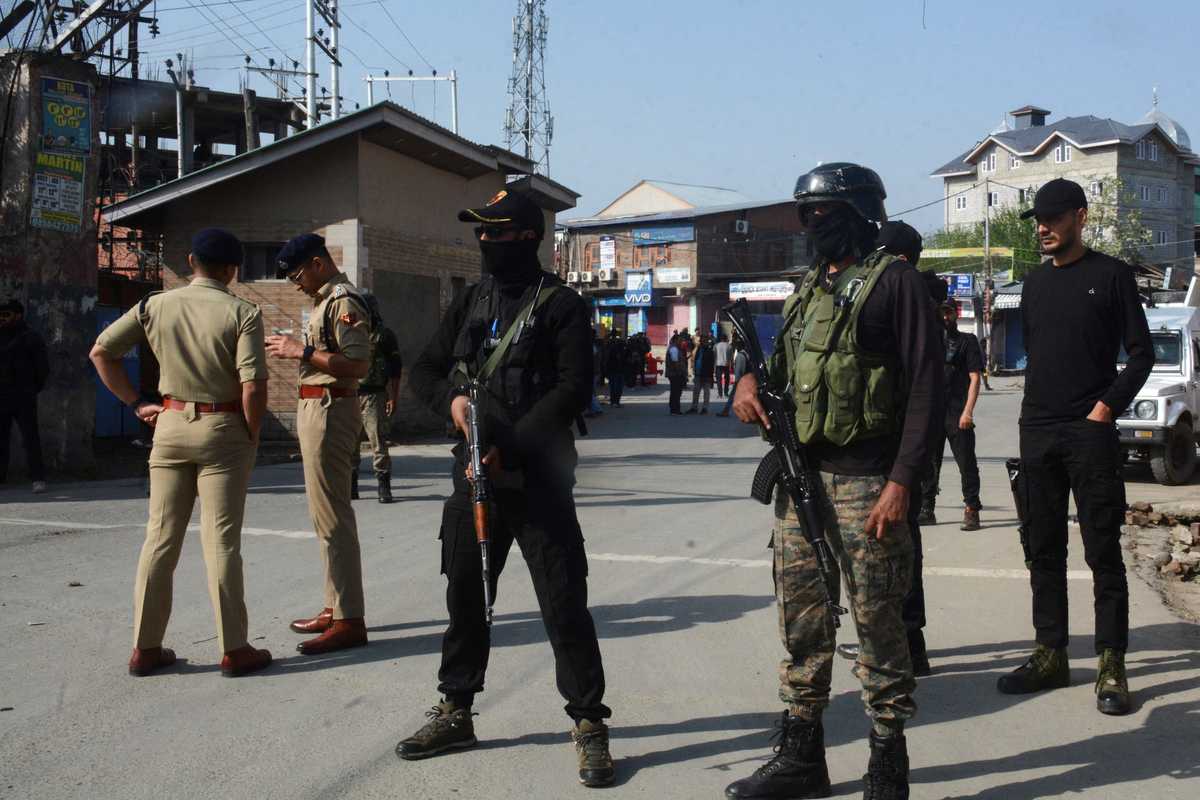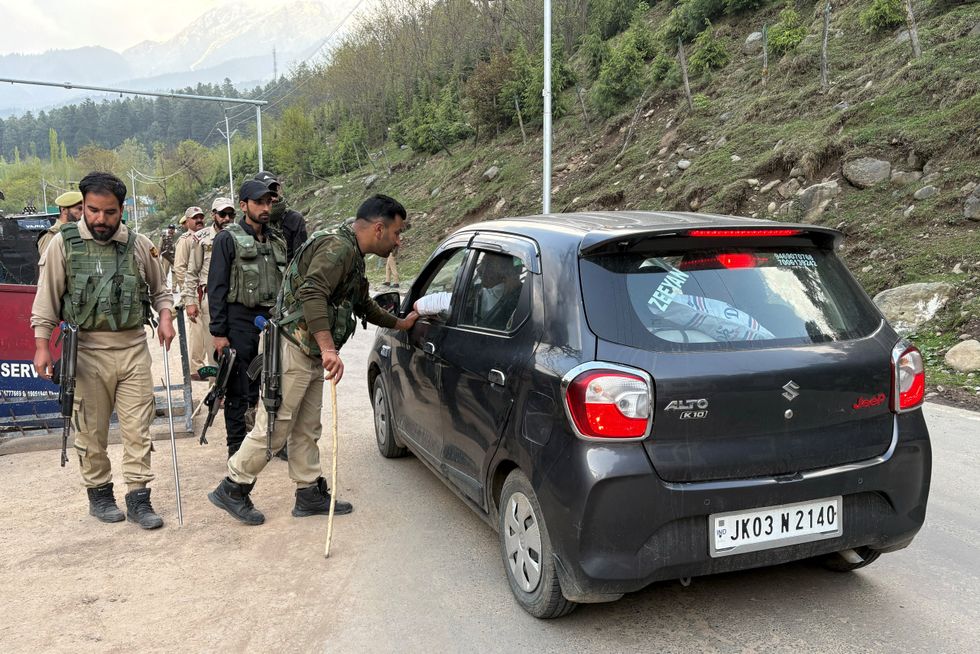News Desk
The News Desk provides timely and factual coverage of national and international events, with an emphasis on accuracy and clarity.

Indian police officers stand guard outside the police control room in Srinagar following an attack near south Kashmir's Pahalgam on April 23, 2025.
India on Wednesday suspended the decades-old Indus Waters Treaty with Pakistan and gave Pakistani nationals 48 hours to leave the country, a day after a deadly terrorist attack in Indian administered Kashmir claimed lives of 26 tourists.
India's unilateral decision to hold the Indus Waters Treaty "in abeyance" appears to contradict Article XII(4) of the treaty itself, which requires termination to occur only through "a duly ratified treaty concluded for that purpose between the two Governments."
The decision was made at a high-level meeting of the Cabinet Committee on Security (CCS), chaired by Prime Minister Narendra Modi. Modi returned to India earlier in the day after cutting short a two-day visit to Saudi Arabia.
The CCS was briefed on the attack in Pahalgam, where militants ambushed a tourist bus yesterday. At least 26 people were killed, including one Nepali citizen, and 10 others were injured.
“This was a cowardly attack targeting a particular religion,” Defense Minister Rajnath Singh said in Delhi. “India will give a loud and clear response. The government will take every necessary step.”
Union Home Minister Amit Shah visited the victims’ families in Jammu and Kashmir earlier in the day. “Bharat will not bend to terror,” he said.
The Indian Cabinet also approved several immediate diplomatic and security steps:
- The Indus Waters Treaty of 1960 is being held in abeyance. It will not be restored until Pakistan “credibly and irrevocably abjures” support for cross-border terrorism.
- The Attari Integrated Check Post has been closed with immediate effect. Pakistanis currently in India may return through this post until May 1.
- SAARC Visa Exemption Scheme visas issued to Pakistani nationals have been cancelled. Those already in India under this scheme must leave within 48 hours.
- Defense, Naval and Air Advisors at the Pakistani High Commission in New Delhi have been declared persona non grata and must leave within a week. India will withdraw its own military advisers from Islamabad.
- The strength of both High Commissions will be reduced from 55 to 30 diplomats and staff by May 1.
The CCS directed all security agencies to maintain high alert and vowed to bring those responsible for the Pahalgam attack to justice.
Referring to the recent extradition of terror suspect Tahawwur Rana, the Indian government said it would remain “unrelenting” in its pursuit of those who commit or support terrorism.

Pakistan's foreign ministry on Wednesday offered its "condolences to the near ones of the deceased".
Meanwhile, Pakistan’s Deputy Prime Minister Ishaq Dar has announced that Pakistan will convene its National Security Committee Thursday to respond to India's recent diplomatic statement.
Prime Minister Shehbaz Sharif called the meeting amid reports Pakistan may declare Indian commission staff as persona non grata and potentially cancel visas for Indian nationals currently in the country.
It was the worst attack on civilians in India since the 2008 Mumbai shootings, and shattered the relative calm in the valley, where tourism has boomed as an anti-India insurgency has waned in recent years.
No group has claimed responsibility but some Kashmiri groups in Jammu and Kashmir have been fighting for independence. Thousands of people have been killed in the conflict in the region since 1989.
The region is held by India and Pakistan in parts and claimed by both in full. A small sliver of Kashmir is also held by China.
Since they were partitioned in 1947, the two countries have fought three wars – in 1948, 1965, and 1971 – two of them over Kashmir.
Also, in the Siachen glacier in northern Kashmir, Indian and Pakistani troops have fought intermittently since 1984. A cease-fire came into effect in 2003.
Consequences
Dr. Abdul Rouf, a hydropolitics expert, told Nukta: “India’s unilateral move to suspend the Indus Waters Treaty (IWT) is a clear violation of Article XII, Clause 4, which states that the treaty remains in force unless terminated by a duly ratified agreement between both governments.
The IWT withstood the wars of 1965 and 1971, as well as the 1999 Kargil conflict. This action—driven by Hindutva ideology—not only breaches international law but also undermines the spirit of cooperation and peaceful conflict resolution that the treaty represents.
International law does not permit an upper riparian country to stop water flows to a lower riparian state. If India sets this precedent, what would stop China from doing the same to India?
Unilaterally revoking a long-standing international treaty calls into question India's credibility and its ability to uphold international commitments.
Indian administered Kashmir is a mountainous region. With limited water storage infrastructure in place, where will the monsoon runoff go? Building reservoirs in such terrain would take decades and cost billions.
This reckless decision jeopardizes already fragile Pakistan-India relations and could have severe consequences for millions of people who depend on these shared waters.
Pakistan remains committed to protecting its national interests through diplomatic and legal means.”
Legal violation
Pakistan’s Defense Minister Khawaja Muhammad Asif has said that India’s move to suspend the Indus Waters Treaty is a violation of international law.
“India cannot make a unilateral decision regarding the Indus Waters Treaty,” Asif said while talking to a private television channel.
He added that a national security meeting has been called for Thursday, where Pakistan will decide on a “comprehensive response” to India’s actions.
Commenting on the Pahalgam attack, Asif said, “We strongly condemn all forms of terrorism anywhere in the world.” He reminded viewers that Pakistan itself has been a major victim of terrorism over the years.
The minister said Pakistan’s armed forces are “fully capable of responding to any misadventure.”
International oversight
Federal Minister for Water Resources Mian Moeen Wattoo also criticized India’s announcement, saying it cannot revoke the treaty on its own.
“The Indus Waters Treaty is backed by international organizations,” Wattoo said, according to a statement issued by Pakistan’s Press Information Department.
He said the agreement is recognized by the global community, and any attempt to abandon it unilaterally violates those commitments.
“Pakistan will not succumb to external pressure,” Wattoo added. “Any aggression from the Indian side will be responded to in a befitting manner.”
*With additional input from Javed Hussain in Islamabad







Comments
See what people are discussing